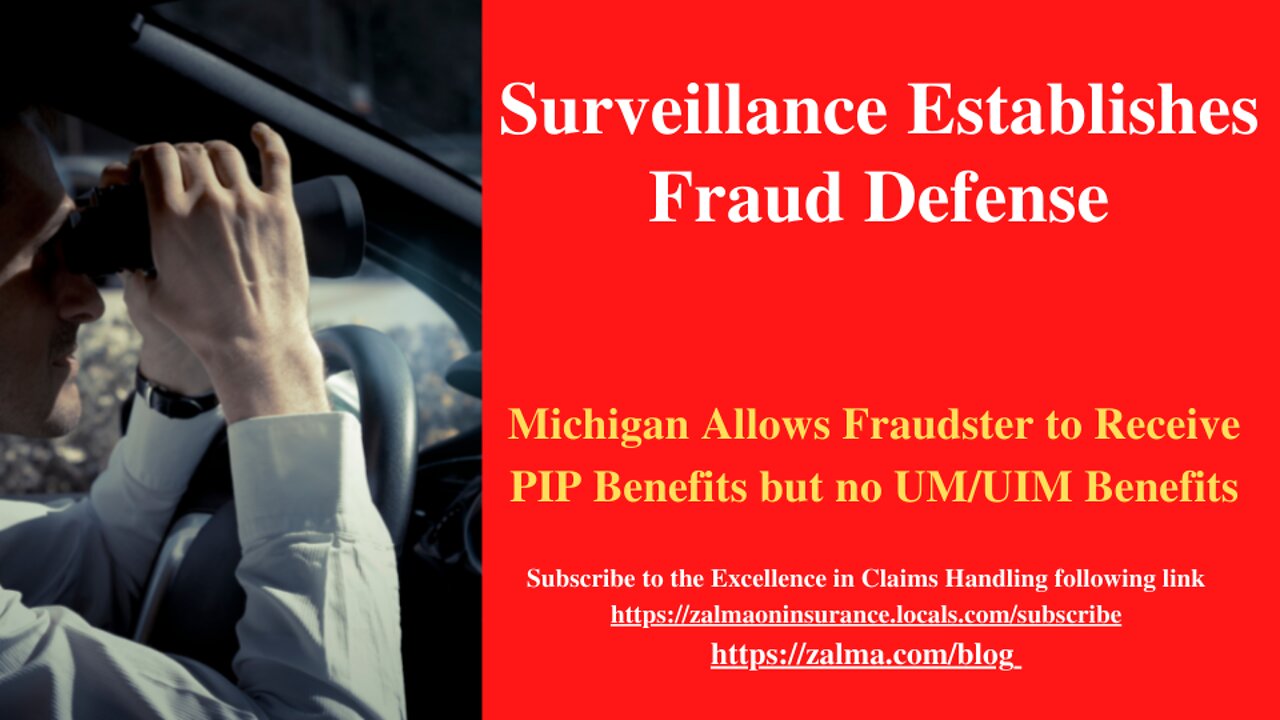Premium Only Content

Surveillance Establishes Fraud Defense
Michigan Allows Fraudster to Receive PIP Benefits but no UM/UIM Benefits
Plaintiff appealed the trial court’s order granting summary disposition in favor of defendants Home-Owners Insurance Company (“Home-Owners”), American Country Insurance Company (ACIC), and Hartford Accident and Indemnity Company (“Hartford”), with respect to plaintiff’s claims for uninsured or underinsured motorist benefits and first-party personal protection insurance (PIP) benefits under the no-fault act, MCL 500.3101 et seq. Although defendants disputed their priority to pay PIP benefits, the trial court did not decide the priority issue, but instead dismissed all claims on the basis of antifraud provisions in defendants’ respective policies.
In Jonathan Jones v. Home-Owners Insurance Company, American Country Insurance Company, And Hartford Accident & Indemnity Company, and Sharneta Henderson, No. 355118, Court of Appeals of Michigan (August 18, 2022) the Court of Appeal produced a Solomon-like decision.
BASIC FACTS
This case arises from a motor vehicle accident on October 28, 2017, in which plaintiff’s vehicle was struck by a vehicle driven by defendant Sharneta Henderson in Detroit. Plaintiff alleges that he was operating a 2009 Ford Crown Victoria and was stopped at a red light when Henderson’s vehicle, traveling at a high rate of speed, drove through a red light and struck his vehicle.
Plaintiff sued all three insurers for recovery of no-fault PIP benefits and also uninsured or underinsured motorist benefits. All three insurers filed motions for summary disposition, asserting that plaintiff’s claims were barred by antifraud provisions in the respective policies.
In support of their allegations of fraud, defendants relied on surveillance evidence from February, June, and July of 2018, which contradicted plaintiff’s statements regarding the scope of his injuries and pain, his physical limitations, and his inability to work. The trial court found that there was no genuine issue of material fact that plaintiff committed fraud by making material misrepresentations in his deposition and held that all three insurers were entitled to summary disposition on the basis of the antifraud provisions in the policies, and accordingly, dismissed all claims against the insurers.
SUMMARY DISPOSITION
PRIORITY UNDER MCL 500.3114
Initially, the Court of Appeal concluded that the trial court erred by failing to address which insurer had priority to pay PIP benefits under MCL 500.3114.
The general rule is that one looks to a person’s own insurer for no-fault benefits unless one of the statutory exceptions applies. An individual may be entitled to PIP benefits mandated by the no-fault act even if the person is not a named insured “under a no-fault policy, and such a person is not subject to the policy’s antifraud provision.” Because the plaintiff’s entitlement to no-fault benefits was governed by statute, the exclusionary provision in the defendant’s no-fault policy did not apply and could not operate to bar the plaintiff’s claims.
Accordingly, the Court of Appeal reversed the trial court’s order granting summary disposition and remanded the case for a determination of the priority of the potential insurers, whether plaintiff is entitled to benefits under a policy, and whether the benefits arise by statute or contract.
POST-PROCUREMENT FRAUD
Although the trial court concluded that summary disposition was appropriate because of the antifraud provisions of the insurance policies at issue, it failed to determine whether plaintiff was considered an insured for purposes of the policies and whether any alleged fraud occurred to induce the policies as opposed to post-procurement fraud and whether statutory or common-law defenses were available in light of the fraud at issue. See Meemic Ins Co v Fortson, 506 Mich. 287, 305; 954 N.W.2d 115 (2020); Williams v Farm Bureau Mut Ins Co of Mich, 335 Mich.App. 574, 578, 580; 967 N.W.2d 869 (2021) (holding that if the alleged fraud did not influence or induce the policy’s procurement, and antifraud provisions are invalid when they purport to apply to misrepresentations or fraud that occurs after the policy has been issued.
UNINSURED AND UNDERINSURED MOTORIST BENEFITS
Plaintiff’s complaint also included claims for uninsured and underinsured motorist coverage. The insurance policy itself will govern the interpretation of its provisions regarding uninsured motorist coverage benefits, which are not required by statute. In cases in which uninsured motorist benefits are at issue, the policy definitions are controlling. Accordingly, because uninsured and underinsured motorist coverage is not mandated by the no-fault act, there is no prohibition against enforcement of the antifraud provisions in the defendant insurers’ policies as applied to this coverage.
The evidence reflects that plaintiff made repeated statements at his December 2018 deposition regarding his pain and physical limitations following the accident, which he claimed affected his mobility and ability to lift items, and his ability to work. These statements were directly contradicted and established to be factually inaccurate by the surveillance evidence, which showed plaintiff moving freely without apparent pain and discomfort, and repeatedly lifting heavy items into a vehicle. Accordingly, the trial court properly concluded that the evidence, specifically plaintiff’s deposition testimony and the surveillance evidence, establishes that there is no genuine issue of material fact regarding whether plaintiff made false and material misrepresentations, knowing the representations to be false.
False statements made during discovery do not provide grounds to void the policy. To be clear, once an insurer fails to timely pay a claim and suit is filed, the parties’ duties of disclosure are governed by the rules of civil procedure, not the insurance policy. A plaintiff-insured only commences suit after the defendant-insurer denies the plaintiff’s claim and that the denial cannot possibly be based on an event that has not yet taken place. This does not mean that a defendant cannot rely on evidence of fraud obtained after litigation commences. It simply means that the evidence must relate to fraud that took place before the proceedings began.
Plaintiff’s statements during his deposition, which took place after litigation commenced, cannot be used to implicate an antifraud provision in an insurance policys. However, fraudulent statements made before litigation is commenced properly can be considered and can implicate an antifraud provision in an insurance policy.
In this case, plaintiff participated in a recorded interview with a Home-Owners representative on February 16, 2018, before this litigation was commenced. Plaintiff made all of the same false statements he made in his later deposition.
At the time of his recorded statement, plaintiff lied about the extent of his injuries and his condition that was proved false by the surveillance evidence.
Viewing the evidence in a light most favorable to plaintiff, there is no genuine issue of material fact that plaintiff made material misrepresentations regarding his physical limitations, including his ability to conduct his daily activities of living, that were established by the surveillance evidence to be factually incorrect and untruthful. The surveillance evidence was clear, uncontroverted, and undermined plaintiff’s claim that his injuries hindered his ability to care for himself.
The evidence was also such that reasonable minds could not disagree that plaintiff made the statements during his recorded interview knowing that they were false, and with the intent that a no-fault insurer would act on them to determine that he was entitled to coverage. Accordingly, the Court of Appeal concluded that trial court did not err by dismissing plaintiff’s claims for uninsured and underinsured motorist benefits on the basis of plaintiff’s fraudulent misrepresentations.
In sum, the Court of Appeal affirmed the trial court’s order granting defendants summary disposition with respect to plaintiff’s claim for uninsured or underinsured motorist benefits but reversed the order to the extent that it dismissed plaintiff’s claim for PIP benefits and remand for further proceedings.
ZALMA OPINION
The Michigan no-fault statute needs amendment to deprive a person of benefits if he or she commits fraud in the presentation of the claim. This case allows the plaintiff to collect no-fault benefits even though his presentation of claim is clearly false and fraudulent. Trial to determine the extent of those benefits – because of the fraud – will be interesting and limited. Of course, since the fraud is so obvious, plaintiff Jones should be arrested, tried and convicted for insurance fraud under the state’s criminal statutes. Michigan Insurance Code Section 500.4503, and Section 500.4511 make it a felony to knowingly lying about, or concealing an important fact in connection with a insurance claim or payment made under an insurance policy. Applies to issuing fake insurance policies and rate-fixing. Also includes conspiring to do any of the above. The court should have referred Jones to the district attorney.
-
 8:57
8:57
Barry Zalma, Inc. on Insurance Law
11 months agoNo Coverage for Benefits no Right to Bad Faith Damages
172 -
 2:00:37
2:00:37
Space Ice
14 hours agoSpace Ice & Redeye Try To Figure Out Seagal's Most Incoherent Movie
124K3 -
 1:00:36
1:00:36
PMG
1 day ago $10.71 earned"Santa Trump is Giving Us Hope - But Will Johnson Stand Strong?"
96.2K14 -
 54:30
54:30
LFA TV
1 day agoThe German Strongman’s Arrival Is Imminent | Trumpet Daily 12.18.24 7PM EST
72.6K6 -
 2:04:11
2:04:11
Melonie Mac
11 hours agoGo Boom Live Ep 32! Soul Reaver Remastered!
59.9K10 -
 39:11
39:11
Sarah Westall
9 hours agoDigital Slavery and Playing with Fire: Money, Banking, and the Federal Reserve w/ Tom DiLorenzo
76.6K8 -
 1:38:38
1:38:38
2 MIKES LIVE
14 hours ago2 MIKES LIVE #157 ILLEGALS, PROTESTORS AND DRONES!
47.4K1 -
 1:01:03
1:01:03
LFA TV
1 day agoTHE LATEST SPENDING BILL IS AN ABOMINATION! | UNGOVERNED 12.18.24 5pm EST
48.4K48 -
 1:43:34
1:43:34
Redacted News
13 hours agoBREAKING! WARMONGERS PUSHING TRUMP TO LAUNCH PRE-EMPTIVE WAR WITH IRAN | Redacted News
162K286 -
 1:00:26
1:00:26
Candace Show Podcast
12 hours agoPiers Morgan x Candace Owens | Candace Ep 123
102K273